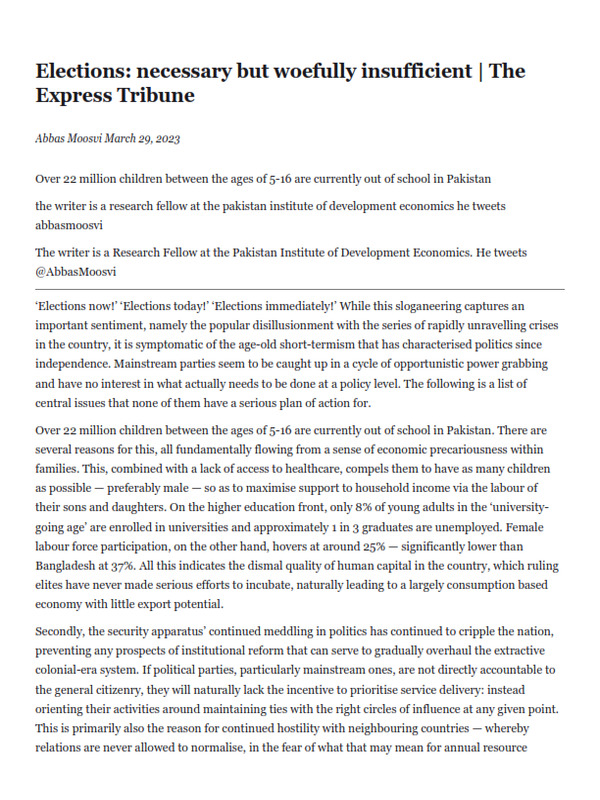Elections: necessary but woefully insufficient
Over 22 million children between the ages of 5-16 are currently out of school in Pakistan
The writer is a Research Fellow at the Pakistan Institute of Development Economics. He tweets @AbbasMoosvi
‘Elections now!’ ‘Elections today!’ ‘Elections immediately!’ While this sloganeering captures an important sentiment, namely the popular disillusionment with the series of rapidly unravelling crises in the country, it is symptomatic of the age-old short-termism that has characterised politics since independence. Mainstream parties seem to be caught up in a cycle of opportunistic power grabbing and have no interest in what actually needs to be done at a policy level. The following is a list of central issues that none of them have a serious plan of action for.
Over 22 million children between the ages of 5-16 are currently out of school in Pakistan. There are several reasons for this, all fundamentally flowing from a sense of economic precariousness within families. This, combined with a lack of access to healthcare, compels them to have as many children as possible — preferably male — so as to maximise support to household income via the labour of their sons and daughters. On the higher education front, only 8% of young adults in the ‘university-going age’ are enrolled in universities and approximately 1 in 3 graduates are unemployed. Female labour force participation, on the other hand, hovers at around 25% — significantly lower than Bangladesh at 37%. All this indicates the dismal quality of human capital in the country, which ruling elites have never made serious efforts to incubate, naturally leading to a largely consumption based economy with little export potential.
Secondly, the security apparatus’ continued meddling in politics has continued to cripple the nation, preventing any prospects of institutional reform that can serve to gradually overhaul the extractive colonial-era system. If political parties, particularly mainstream ones, are not directly accountable to the general citizenry, they will naturally lack the incentive to prioritise service delivery: instead orienting their activities around maintaining ties with the right circles of influence at any given point. This is primarily also the reason for continued hostility with neighbouring countries — whereby relations are never allowed to normalise, in the fear of what that may mean for annual resource allocations and big corporate conglomerates under the men in uniform. This despite the recent move towards multipolarity in light of the Ukraine-Russia conflict, evidenced by the resumption of bilateral relations between Iran and Saudi Arabia, brokered by China, following seven long years of silence. A divided community of developing countries not only means colossal losses in potential trade, cultural exchange, collaborations on art, education, science/technology, etc, but also the total elimination of a possible consolidated diplomatic push for climate justice, which the Global South is, by all measures, rightfully owed.
What is lost as a result of the prevalent pathologies of governance is that actual issues are not (and cannot be) addressed. These include land reforms, which Pakistan has never been able to conduct in a meaningful capacity, leading to low agricultural productivity and the continued dominance of ‘electables’ who control votes in their respective constituencies via coercive means; overhaul of the energy sector, currently shaped by rent-seeking from IPPs that have increased Pakistan’s reliance on oil and gas import and runaway debt accumulation; rethinking of industries, the space for which is dominated by powerful lobbies that are primarily only concerned with lining their own pockets; and curtailing the influence of multilateral donor agencies and IFIs which have mindlessly peddled austerity and neoliberal policy prescriptions (privatisation, deregulation, trade liberalisation), systematically eroding state capacity over time.
Mainstream parties in Pakistan do not even have an adequate understanding of any of the aforementioned issues at a level beyond the surface, largely because leadership is either based on familial/dynastic ties or cult of personality. General elections must take place as soon as possible as a matter of principle and upholding constitutional stipulations; but to assume that they alone will lead Pakistan out of the quagmire it finds itself in is merely wishful thinking.
Published in The Express Tribune, March 29th, 2023.




